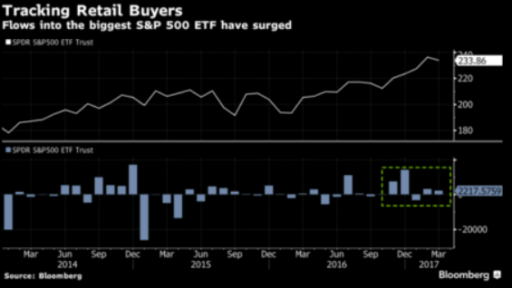- Home
- >
- Market Rumours
- >
- Retail rush to U.S. stocks not everyone’s idea of euphoric news

Retail rush to U.S. stocks not everyone’s idea of euphoric news

For a read on the bull market, look at who’s buying. Right now, it’s a dwindling list. With hedge funds, corporate executives and even companies backing away from equities, the post-election rally is increasingly reliant on the little guy. Not everyone thinks he’s enough. Gains that added almost $3 trillion to share values have awakened the last market skeptics -- look no further than the $128 billion that went into passive funds over the last 12 weeks. It happened as consumer sentiment soared and fund managers dipped into cash piles. While one buyer is better than none, some pros view interest from small investors skeptically, a warning sign that the eight-year bull market is entering a final phase characterized by euphoria. The market is front-page news and everyone’s looking to cash in on a can’t-miss rally, or so it seems.
“It’s always a concern this far in and at these valuations,” Julian Emanuel, executive director of U.S. equity and strategy at UBS Securities LLC, said in an interview on Bloomberg Television. “That’s part of our call for near-term caution. A lot of new money has come into markets the last couple months.”Between November and February, the biggest exchange-tradedfund tracking the S&P 500 saw $21 billion of inflows, the most for any like stretch since 2014, according to data compiled by
Bloomberg. Of course, retail buying could also be framed positively, and even in its contrarian conception is just one of a handful of concerns among investors facing the eighth year of the bull
market. After posting the worst week this year, the S&P 500 is just 2.3 percent below its record on March 1 and valuations are at the highest since the financial crisis.
At the same time, fund manager cash holdings fell to an average 4.8 percent from a 15-year high of 5.8 percent in October, according to a March 21 report by Bank of America Corp. For some, who’s behind the rally is seen as less relevant
than the backdrop of economic data that continues to beat Wall Street expectations.
“While there will be pullbacks and corrections and all the rest, you need a much more general sense of euphoria and signs the economy is approaching a serious slowdown to get a top,” Marshall Front, who oversees $800 million as chief investment officer at Front Barnett Associates LLC in Chicago, said by phone. “Right now you have neither.” Still, there’s evidence that high stock market participation across American households doesn’t bode well for the market. Current equity holdings are comparable to peaks in 1968 and 2007, and returns 10 years after high degrees of participation are “generally poor,” analysts at Ned Davis Research Inc. wrote. “Our wealth advisers who deal with individual investors have struggled to get their clients into the market,” Ed Clissold, chief U.S. strategist at Venice, Florida-based Ned Davis Research, said by phone. “That’s been a part of the market that hasn’t participated as much in the rally. Now that they’re getting in more, and getting more fully invested, that means less potential future buying.” It’s happening as other investor types shy away from the market. Macro hedge funds have decreased their exposure to stocks and bonds while maintaining positions in the dollar and commodities in 2017, according to a the Bank of America report. At the same time, insider buying among corporate executives has slowed. About 2,300 insiders bought shares of their companies in the past month, down from a one-year high reached at the start of the month, data compiled by InsiderScore show.
The seemingly endless appetite for corporate buybacks is also showing sings of ebbing, with U.S. firms purchasing 6 percent less last year, the biggest yearly drop since 2009, according to S&P Dow Jones Indices. “We’ve increased our equity exposures a little bit as signals turn more bullish,” said Matt Chancey, an independent financial planner at Orlando, Florida-based Chancey Wealth Management, who helps oversee about $50 million, said by phone. “Our clients are happy their accounts are going up. You’ll never have a client calling you at the top of the market saying, ‘I’m ready to get defensive and go into cash.”’
Bloomberg
 Varchev Traders
Varchev Traders Read more:
If you think, we can improve that section,
please comment. Your oppinion is imortant for us.










